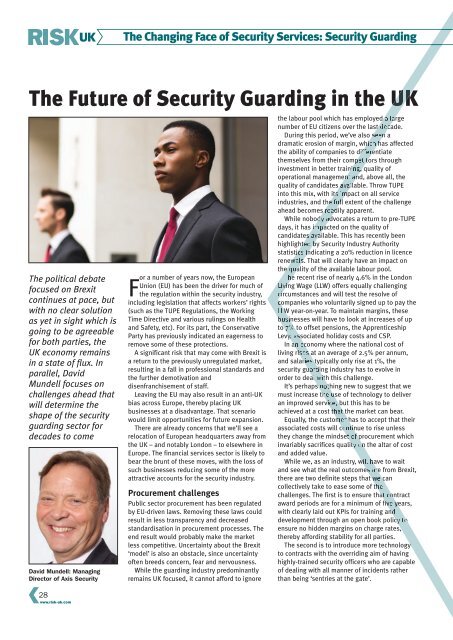RiskUKDecember2017
Create successful ePaper yourself
Turn your PDF publications into a flip-book with our unique Google optimized e-Paper software.
The Changing Face of Security Services: Security Guarding<br />
The Future of Security Guarding in the UK<br />
The political debate<br />
focused on Brexit<br />
continues at pace, but<br />
with no clear solution<br />
as yet in sight which is<br />
going to be agreeable<br />
for both parties, the<br />
UK economy remains<br />
in a state of flux. In<br />
parallel, David<br />
Mundell focuses on<br />
challenges ahead that<br />
will determine the<br />
shape of the security<br />
guarding sector for<br />
decades to come<br />
David Mundell: Managing<br />
Director of Axis Security<br />
28<br />
www.risk-uk.com<br />
For a number of years now, the European<br />
Union (EU) has been the driver for much of<br />
the regulation within the security industry,<br />
including legislation that affects workers’ rights<br />
(such as the TUPE Regulations, the Working<br />
Time Directive and various rulings on Health<br />
and Safety, etc). For its part, the Conservative<br />
Party has previously indicated an eagerness to<br />
remove some of these protections.<br />
A significant risk that may come with Brexit is<br />
a return to the previously unregulated market,<br />
resulting in a fall in professional standards and<br />
the further demotivation and<br />
disenfranchisement of staff.<br />
Leaving the EU may also result in an anti-UK<br />
bias across Europe, thereby placing UK<br />
businesses at a disadvantage. That scenario<br />
would limit opportunities for future expansion.<br />
There are already concerns that we’ll see a<br />
relocation of European headquarters away from<br />
the UK – and notably London – to elsewhere in<br />
Europe. The financial services sector is likely to<br />
bear the brunt of these moves, with the loss of<br />
such businesses reducing some of the more<br />
attractive accounts for the security industry.<br />
Procurement challenges<br />
Public sector procurement has been regulated<br />
by EU-driven laws. Removing these laws could<br />
result in less transparency and decreased<br />
standardisation in procurement processes. The<br />
end result would probably make the market<br />
less competitive. Uncertainty about the Brexit<br />
‘model’ is also an obstacle, since uncertainty<br />
often breeds concern, fear and nervousness.<br />
While the guarding industry predominantly<br />
remains UK focused, it cannot afford to ignore<br />
the labour pool which has employed a large<br />
number of EU citizens over the last decade.<br />
During this period, we’ve also seen a<br />
dramatic erosion of margin, which has affected<br />
the ability of companies to differentiate<br />
themselves from their competitors through<br />
investment in better training, quality of<br />
operational management and, above all, the<br />
quality of candidates available. Throw TUPE<br />
into this mix, with its impact on all service<br />
industries, and the full extent of the challenge<br />
ahead becomes readily apparent.<br />
While nobody advocates a return to pre-TUPE<br />
days, it has impacted on the quality of<br />
candidates available. This has recently been<br />
highlighted by Security Industry Authority<br />
statistics indicating a 20% reduction in licence<br />
renewals. That will clearly have an impact on<br />
the quality of the available labour pool.<br />
The recent rise of nearly 4.6% in the London<br />
Living Wage (LLW) offers equally challenging<br />
circumstances and will test the resolve of<br />
companies who voluntarily signed up to pay the<br />
LLW year-on-year. To maintain margins, these<br />
businesses will have to look at increases of up<br />
to 7% to offset pensions, the Apprenticeship<br />
Levy, associated holiday costs and CSP.<br />
In an economy where the national cost of<br />
living rises at an average of 2.5% per annum,<br />
and salaries typically only rise at 1%, the<br />
security guarding industry has to evolve in<br />
order to deal with this challenge.<br />
It’s perhaps nothing new to suggest that we<br />
must increase the use of technology to deliver<br />
an improved service, but this has to be<br />
achieved at a cost that the market can bear.<br />
Equally, the customer has to accept that their<br />
associated costs will continue to rise unless<br />
they change the mindset of procurement which<br />
invariably sacrifices quality on the altar of cost<br />
and added value.<br />
While we, as an industry, will have to wait<br />
and see what the real outcomes are from Brexit,<br />
there are two definite steps that we can<br />
collectively take to ease some of the<br />
challenges. The first is to ensure that contract<br />
award periods are for a minimum of five years,<br />
with clearly laid out KPIs for training and<br />
development through an open book policy to<br />
ensure no hidden margins on charge rates,<br />
thereby affording stability for all parties.<br />
The second is to introduce more technology<br />
to contracts with the overriding aim of having<br />
highly-trained security officers who are capable<br />
of dealing with all manner of incidents rather<br />
than being ‘sentries at the gate’.

















